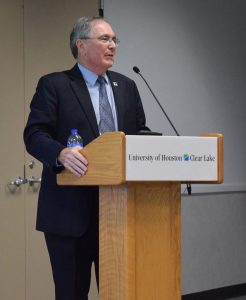
Budget shortfall of $13.9 million prompts counteractive measures

President William Staples announced a $13,920,040 general revenue and tuition shortfall in the University of Houston-Clear Lake budget for fiscal year 2018 in an open meeting Feb. 9.
The budget gap between projected enrollment rates and expected funding and tuition stems from a 14.5 percent decrease in graduate semester credit hours from fiscal year 2014 to fiscal year 2016. These years were base period years, which are used to determine state formula funding for the next biennium. Undergraduate semester credit hours increased by 11.6 percent between base years but are worth less in formula funding.
“This is not that unusual for upper-levels that become four-year universities, to an extent,” Staples said.
The shortfall is also based on projections of enrollment, which may change.
“If our enrollment reductions aren’t that bad, then the budget impact won’t be that bad,” said Faculty Senate President Lisa Gossett. “We’ve got six months of recruiting that we can do before fiscal year 2018 begins, and hopefully this has us addressing some issues that we’ve needed to address for a long time.”
Based on the information available, Staples said that he does not expect layoffs. To offset the gap, UHCL has implemented a hiring freeze to prioritize vacant positions. This internal freeze is in addition to an existing hiring freeze Gov. Greg Abbott placed on all state funds until Aug. 31.
Course availability may be affected as class schedules are reviewed.
“We’re going to have to reduce summer and fall course schedules, so that we’re serving students where we have the greatest demand,” Staples said.
All graduate programs will be reviewed based on data from the enrollment management firm Ruffalo Noel Levitz. The firm reports that as of the Fall 2015 semester, 10 of the 45 graduate programs offered at UHCL accounted for 60 percent of graduate enrollment.
The review of graduate programs has received mixed responses.
“Personally, being a graduate student, I know that some of the programs are not very competitive with other universities,” said A.J. Johnson, President of the Student Government Association. “I think we should look at the different programs and see what we can do to make them better and focus on the ones that are really popular with students in the market for a graduate school.”
The goal of making UHCL more competitive has some faculty worried for smaller programs.
“There are a number of degrees that attract the greatest number of graduate students, but those are going to be in the areas where you’ve got the most competition, like an MBA,” Gossett said. “We have some niche programs. … I think we need to be careful to not throw those out as we look ahead.”
Staples said one method to improve enrollment is diversification of international enrollment, which has recently declined. The significant majority of international students at UHCL are from India, and most international students are in graduate programs, contributing to the overall decrease in graduate semester credit hours.
“With the environment the world’s in right now, it’s a safer bet to try to get students from a lot of different countries than just one main country,” Johnson said.
The UHCL campus will continue constructing new building additions, with student housing, a Recreation and Wellness Center and a STEM building scheduled to be completed by Fall 2018. UHCL Pearland Campus will also complete a new health sciences building in Fall 2018. UHCL secured funding for the construction in a previous legislative session, and the buildings will not be affected by the current session.
“That will start to give our campus a better look for students who want to come here and tour campus,” Johnson said. “We will have three brand new buildings and the option to live on-campus.”
Staples listed other actions being taken to address the budget reduction and decline in enrollment, including reviewing all university services, adding online graduate courses, and shifting advertisements to specific academic programs. A new UHCL website is also set to debut later in the spring.
The current Texas legislative session could also affect special items funding. The budget bill in the House of Representatives cuts special items funding by 10 percent and the Senate budget bill removes all special items for individual review.
“At this point we are watching because it is very early in the process,” said Mary Aldridge Dean, executive director of the Texas Faculty Association. “If they actually don’t fund any special items it will be devastating to everyone; faculty and students.”
UHCL has received special items funding previously for projects such as the Center for Autism and Developmental Disabilities, the Environmental Institute of Houston, and the High Technologies Laboratory.
The Texas legislative session runs from January to May, and the House and Senate budget bills are still in an early form. Staples plans to send email updates or hold additional meetings as needed throughout the semester.
“We can work ourselves out of this problem,” Staples said. “I truly believe that.”
